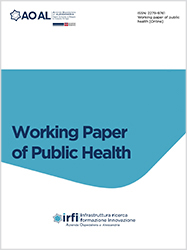Un’indagine sulle competenze e la pratica degli infermieri riguardo alla somministrazione di farmaci mediante sondini enterali: studio trasversale
All claims expressed in this article are solely those of the authors and do not necessarily represent those of their affiliated organizations, or those of the publisher, the editors and the reviewers. Any product that may be evaluated in this article or claim that may be made by its manufacturer is not guaranteed or endorsed by the publisher.
Autori
Background: la conoscenza del personale sanitario in merito alla corretta somministrazione di farmaci per via enterale risulta necessario per ridurre la morbilità e la mortalità dei pazienti. L’obiettivo dello studio è quello di valutare le competenze e la modalità di gestione della somministrazione di farmaci per via orale da parte degli infermieri in pazienti ospedalizzati portatori di sondino per nutrizione enterale. Materiali e Metodi: studio osservazionale cross-sectional che includeva infermieri dell’Azienda Ospedaliera Universitaria (AOU) in servizio da almeno sei mesi. È stato somministrato un sondaggio che prevedeva 16 domande inerenti alla diluizione dei farmaci, gestione delle forme farmaceutiche e tecnica di somministrazione dei farmaci per via enterale. Risultati: sono stati arruolati 218 infermieri con età media di 30.95 anni (DS 6.15), di cui 132 (60.5%) erano femmine, 173 (78.9%) avevano conseguito una laurea triennale. Circa le metà delle risposte (49.3%) risultava errata. Conclusioni: la conoscenza degli infermieri sulla somministrazione dei farmaci per via enterale dovrebbe essere incrementata. Gli infermieri sono responsabili della gestione farmacologica e il livello di conoscenza influisce direttamente sulla salute e sicurezza di questi pazienti; pertanto, sarebbe opportuna una formazione specifica che consideri le lacune riscontrate.
Come citare

Questo volume è pubblicato con la licenza Creative Commons Attribuzione - Non commerciale 4.0 Internazionale.






